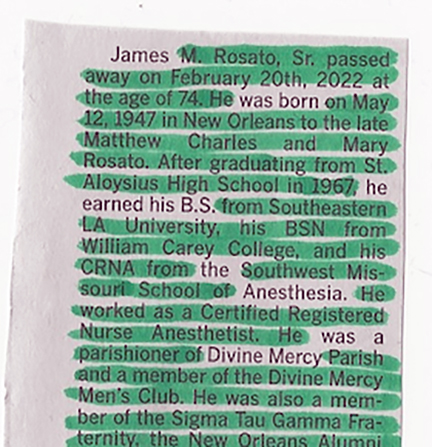


Are you sure you want to reset the form?
Your mail has been sent successfully
Are you sure you want to remove the alert?
Your session is about to expire! You will be signed out in
Do you wish to stay signed in?

An obituary is a newspaper item about a recently deceased person’s life. No one knows who they are addressed to, exactly. In reading them, one may or may not understand who they are about.
Step 1
Find a newspaper and turn to the obituary section. Read several obituaries. Notice the registers and idioms of the language used. Notice the patterns of the lives described. Notice what is included as well as what seems to be left out.
Step 2
This experiment is a close cousin of the popular “blackout poetry” method, but with a stricter framework—we are writing about the dead. Select your favorite obituary. Fetch a pencil or a highlighter. Underline every other line. Reread the obituary. Now you have two different obituaries. Are they about the same person?
Step 3
Repeat the process, but this time omit every other line. Or omit entire sections. Select your favorite phrases and string them together. What changes reveal something new, funny, or devastating about the deceased? About the living, or the dead’s survivors?
Step 4
The blacked out or highlighted text can be a poem itself, of course. But also try to write down your above findings on a separate sheet of paper and create a new poem, maybe one that has nothing to do with obituaries or death.
